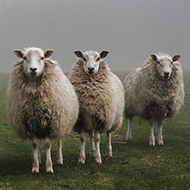
Vets discuss current thoughts and practices on this stress-inducing issue.
An intriguing discussion on managing sheep lameness has highlighted the importance of engaging with clients and navigating the emotional aspects of the condition.
More than 20 delegates joined the XL Vets Lameness in Sheep evening, held in Association with MSD Animal Health. During the discussion, attendees and a panel of experts shared current thoughts and practices in preventing and treating lameness.
The discussion highlighted that lameness in a flock can be an emotive issue for many farmers, not least owing to pressure from public opinion if people see lame sheep while out walking. Many farmers said that lameness in the flock felt like ‘a badge of failure’.
Delegates also spoke how it has never been more important for vets to be able to engage and help their clients with this economically-damaging and stress-inducing issue. They identified changing mindset and building confidence as critical to motivating farmers to tackle lameness within their flock.
Another topic discussed was the national five-point plan for reducing lameness in sheep. Delegates highlighted several obstacles to its implementation, including farmers being more likely to take advice from their peers than vets.
Panellist Jenny Schmidt from Torch Farm Vets offered some tips on how to develop this relationship, while Caroline Best, who is studying the cause and control of lameness in sheep in her PhD, said that ensuring advice given to farmers is bespoke and relevant can have a particular impact:
“Lameness is so specific to a flock, and what may be one farmer’s motivation may be another farmer’s barrier. Tailoring the five-point plan to individuals and working in a partnership helps to decrease the resignation felt by farmers, and ultimately shows that success can be achieved working within their own resources.”
A key theme of the meeting was that working in partnership can benefit both vet and farmer. Schmidt pointed out that farmers are generally better at spotting lameness in sheep, but vets are the experienced hand in diagnosing the issue.
Monika Ptaszynska from MSD shared some advice for vets who may still be struggling to get onto farms and advocated using technology to improve collaboration with colleagues.
“Involving the client in the process of investigating the lameness increases the chance of the farmer being proactive about treatment and future prevention,” she said. “Don’t underestimate both their emotional and financial attachment to their flock.
“There are some great WhatsApp groups for sheep vets, where we can share photos and ask questions within our community. No question is a silly question, and we should never be afraid to tell our clients that we don’t know but will find out. They appreciate the honesty and desire to help.”
The event culminated in a Q&A session, during which delegates shared their own ideas and experiences of lameness.



 The latest
The latest